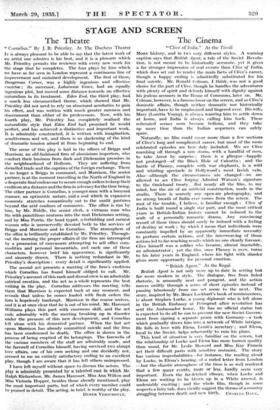STAGE AND SCREEN The Theatre
" Cornelius." By J. B. Priestley. At The Duchess Theatre IT is always pleasant •to be able to say that the latest work of an artist one admires is his best, and it is a pleasure which Mr. Priestley permits the reviewer with every new work for the stage that he completes. The four plays by him which we have so far seen in London represent a continuous line of improvement and sustained development. The first of them, Dangerous Corner, was a highly ingenious and effective exercise ; its successor, Laburnum Grove, had an equally ingenious plot, but moved some distance towards an effective naturalism in its treatment. Eden End, the third play, had a much less circumscribed theme, which showed that Mr. Priestley did not need to rely on structural acrobatics to gain his effect, and was written with much greater sureness and discernment than either of its predecessors. Now, with his fourth play, Mr. Priestley has completely realized the naturalistic style that Eden End had promised he would perfect, and has achieved a distinctive and important work. It is admirably constructed, it is written with imagination, sensitiveness and wit, and there is no slackening of the kind of dramatic tension aimed at from beginning to end.
The scene of this play is laid in the offices of Briggs and Murrison, an old-fashioned firm of aluminium importers, who conduct their business from dark and Dickensian premises in the neighbourhood of Holborn. They are suffering from dwindled trade and the caprices of the foreign exchange. There is no longer a Briggs in command, and Murrison, the senior partner, is at the moment travelling in the North of England in a desperate final endeavour to secure enough orders to keep their creditors at a distance and the firm in solvency for the time being. The other partner is Cornelius, a younger man with a buoyant manner, an optimistic nature, and a soul which in expansive moments stretches romantically out to the sunlit pastures beyond the arid confines of commerce. The office is run by him, by Mr. Biddle, the senior clerk, a virtuous man who fits with punctilious neatness into the neat Dickensian setting, and by Miss Porrin, the head typist, a forbidding and earnest woman who is unreservedly devoted both to the services of Briggs and. Murrisoir and to Cornelius. The atmosphere of the office is brilliantly established by Mr. Priestley. Through- out the morning the proper affairs of the firm are interrupted by a procession of canvassers attempting to sell office com- modities and personal inessentials, and each one of these characters, however brief his appearance, is significantly and sincerely drawn. There is nothing redundant in Mr. Priestley's description : every detail is significantly applied.
The second act presents a meeting of the firm's creditors which Cornelius has found himself obliged to call. Mr. Priestley's account of this rank and dismal crew is an admirable satirical creation, and the act as a whole represents the best writing in the play. Cornelius addresses the meeting, tells them that Murrison is expected back at any moment, and reveals that unless he comes loaded with fresh orders the firm is hopelessly bankrupt. Murrison in due course arrives, and it is at once clear that he is out of his mind. Mr. Harcourt Williams plays this part with enormous skill, and the act ends admirably with the meeting breaking up in disorder under the pressure of this new development, and Cornelius left alone with his demented partner. When the last act opens Murrison has already committed suicide and the firm has been condemned to death. The office is shown in the process of being emptied of its belongings. The farewells of the various members of the staff are admirably made, and the farewell of Cornelius himself, having survived two abrupt love affairs, one of his own seeking and one decidedly not, seemed to me an entirely satisfactory ending to an excellent play, though I am aware that it has left others unimpressed.
I have left myself without space to discuss the actors. The play is admirably presented by a talented cast in which Mr.
Ralph Richardson, Mr. James Harcourt, Miss Ann Wilton and Miss Victoria Hopper, besides those already mentioned, play the most important parts, but of which every member could be praised in detail. The acting, in brief, is worthy of the play.
DEREK VERSCHOYLE.






































 Previous page
Previous page